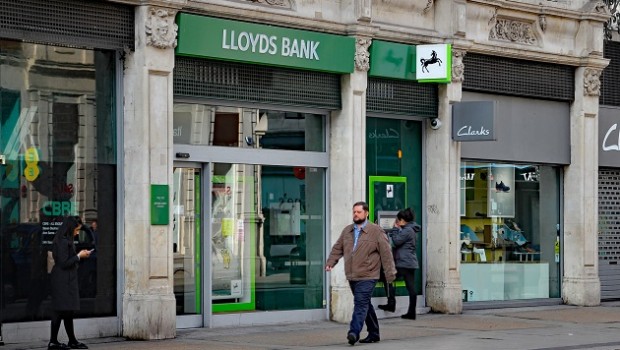Lloyds FY profit soars, puts aside £450m for motor finance probe

Lloyds Bank on Thursday reported a 57% jump in full-year profits and announced another £2bn share buyback, but also set aside £450m for the regulatory probe into UK motor financing.
Banks
4,888.64
16:29 27/12/24
FTSE 100
8,149.78
16:54 27/12/24
FTSE 350
4,495.62
16:29 27/12/24
FTSE All-Share
4,453.14
17:05 27/12/24
Lloyds Banking Group
54.36p
17:00 27/12/24
Pre-tax earnings at the lender for the year to December 31 were £7.5bn, although profits in the fourth quarter slipped 4% due to mortgage pricing and deposit mix headwinds. Net income rose 3% to £17.9bn and the full-year dividend was lifted 15% to 2.76p a share.
Lloyds net interest margin – the difference between what it charges for loans and pays out on savings – rose 17 basis points to 3.11% in 2023. However, this fell to 2.98% in the final three months of the year, from 3.08% in the third quarter.
NIM was expected to fall to 2.9% this year, and guided for returns of 13%, down from 15.8% in 2023 before recovering to 15% by 2026.
The initial provision to cover potential claims from the Financial Conduct Authority's review into suspected overcharging by car finance lenders will be a concern to investors, and the bank admitted there was "significant uncertainty" around the extent of any misconduct linked to its Black Horse division, which holds £15.3bn in loans.
Merchant bank Close Brothers, which is also a player in that market, saw its share price slump last week as it axed its dividend in response to the investigation.
"This charge includes estimates for costs and potential redress. There remains significant uncertainty as to the extent of any misconduct and customer loss, if any, the nature of any remediation action, if required, and its timing. Hence the impact could materially differ from the provision, both higher or lower," Lloyds said.
A 'NASTY DETAIL' & ECHOES OF THE PPI SCANDAL
UK consumer advocate and campaigner Martin Lewis has said the FCA investigation could uncover a scandal similar in size to the payment protection insurance (PPI) scandal of the 1990s. Banks sold virtually worthless cover old with mortgages, loans and credit cards to repay people's borrowings if they became ill or lost their jobs.
The scandal ultimately cost banks £50bn despite them resisting calls for compensation - despite their already well-tarnished reputations in the wake of the global financial collapse of 2008 - until a 2011 court case broke the deadlock. Lloyds ended up paying out more than £20bn to policyholders.
AJ Bell investment director Russ Mould called the provision a "nasty detail which may be provoking some nervousness among investors".
“Anyone with memories of the PPI scandal will have doubts over whether the amount set aside so far will represent the final cost of dealing with this issue. Time will tell if £450m represents the tip of the iceberg or an appropriately conservative assumption."
“At best it represents an unhelpful distraction from chief executive Charlie Nunn’s strategy for the company of boosting its digital banking footprint and bolstering its wealth and corporate finance arms.”
Reporting by Frank Prenesti for Sharecast.com